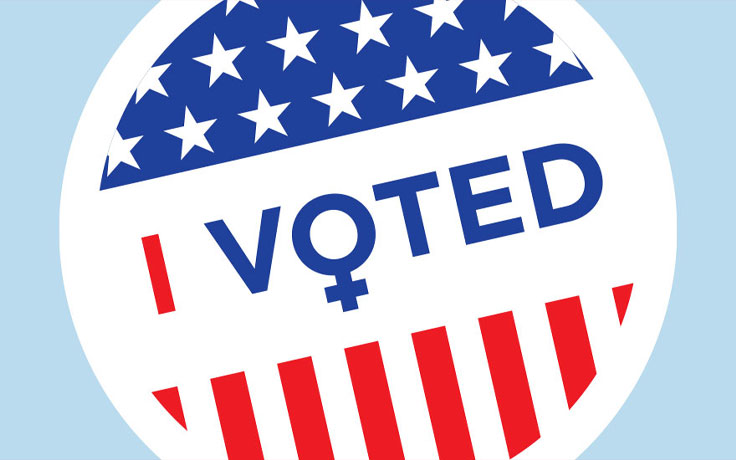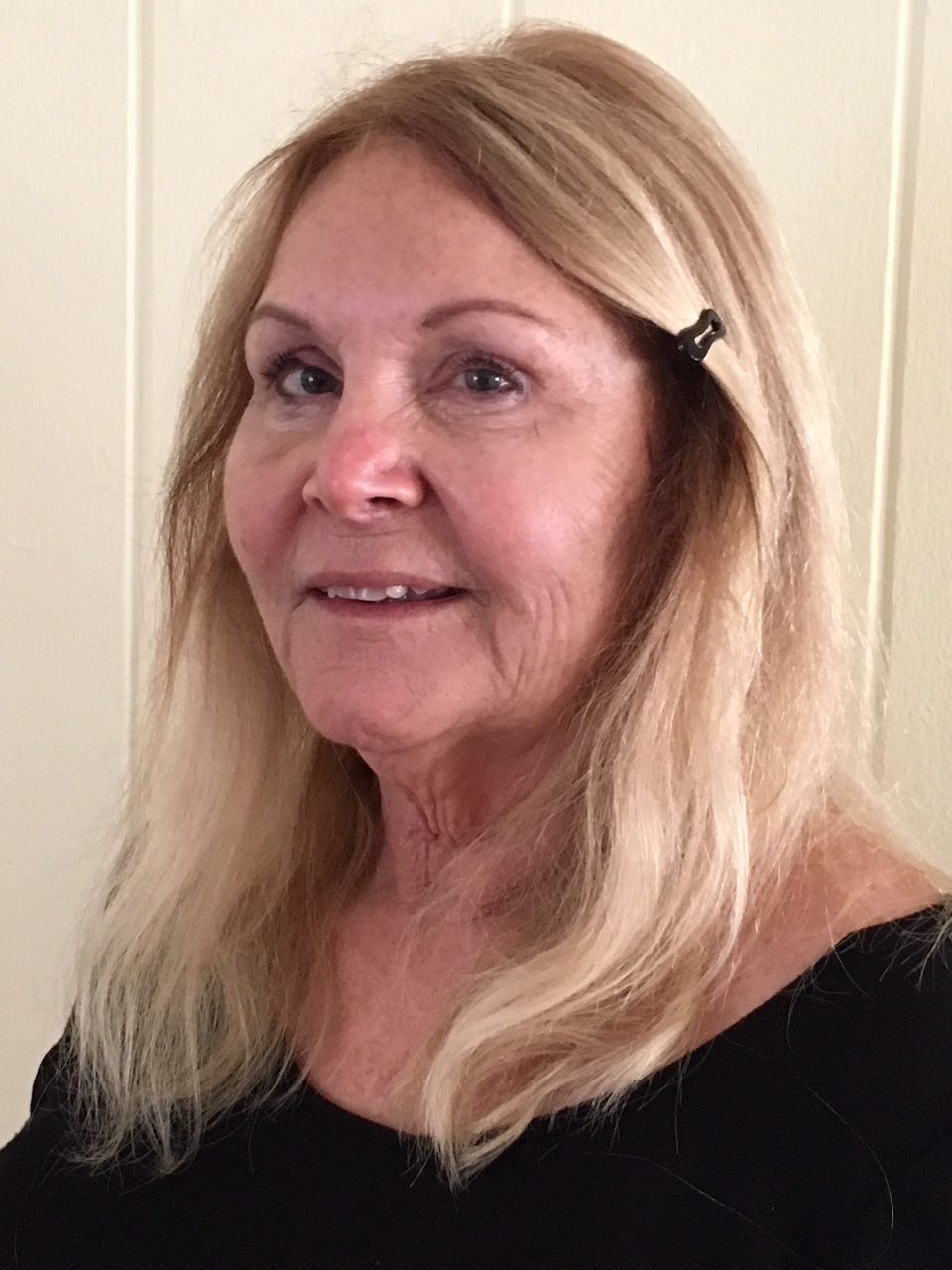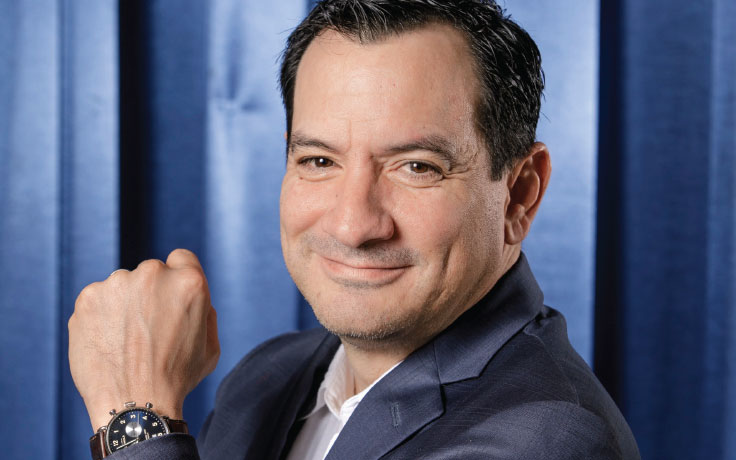It was May 2016, well into the campaign that won Donald Trump the presidency, when Lorrie Frasure-Yokley made an ambitious proposal to probe the political behavior of Americans more deeply.
Instead competing with other institutions for grants to produce relatively limited data that researchers keep for their own studies, Frasure-Yokley suggested creating a nationwide, cooperative, cost-sharing survey that includes more than just one or two racial or ethnic groups.
“I knew 2016 was going to be consequential,” she said during a recent interview in her tidy, narrow office in Bunche Hall. Pale peach walls and family photos softened the fixtures of academia – books and stacks of papers. “We needed quality data from large samples across several major racial and ethnic groups,” she said, “not just a large sample of one group and small samples of other groups.”
Frasure-Yokley, an associate professor of political science and African American Studies at UCLA, had been co-principal investigator of the Collaborative Multiracial Post-Election Survey (CMPS) of 2008 and 2012, the first multi-racial, multi-ethnic, multi-lingual post-presidential election studies of racial and political preferences and behavior.
Now she wanted to step things up and greatly broaden the research for the upcoming election.
By enabling participation from professors at colleges and universities around the country, it would be possible to collect much bigger samples of various racial and ethnic groups. It would also open access to high-quality data to everyone, enabling even smaller institutions with fewer resources to contribute to a growing body of research.
“It was a crazy idea,” Frasure-Yokley said, with a laugh. “That’s not usually the way scholars conduct themselves. But I kept pushing.”
Her effort resulted in the ground-breaking 2016 CMPS, unique in its size and reach. She served as co-principal investigator, along with Matt Barreto (UCLA), Janelle Wong (University of Maryland) and Edward Vargas (Arizona State University). Eighty-six social scientists at 55 schools contributed to building its collaborative dataset by purchasing questions.
Researchers from larger, better-funded institutions participated, along with scholars from smaller colleges and universities with less income. The survey probed the attitudes of more than 10,000 voters and non-voters about candidates, immigration, policing, equality and experiences with racial discrimination. It contained 394 questions in five languages – English, Spanish, Chinese, Korean and Vietnamese – and it took 43 minutes, on average, to complete.
In less than two years after Trump’s election, data from the survey spawned more than a dozen academic articles and books and a textbook. Data from the 2016 CMPS show a deeper, richer tapestry of political behaviors. One book probed the differences among groups who identify as evangelicals. It showed that white evangelicals exhibit much more conservative attitudes on issues ranging from climate change to tax policies than do their counterparts of color. An article to be published in August measures the degrees to which people believe that their own self-interests are linked to those of their racial groups.
A lifetime of firsts
Frasure-Yokley’s life is distinguished by firsts. Born and raised on Chicago’s Southside, she was the first member of her family to attend college. After earning a bachelor’s degree in political science from the University of Illinois at Urbana-Champaign and a master’s degree in public policy from the University of Chicago, she received a master’s degree and a doctorate in political science from the University of Maryland at College Park.
She did postdoctoral work at Cornell. It led to her book, Racial and Ethnic Politics in American Suburbs, which won two national book awards in 2016. She came to UCLA almost 12 years ago and was the first woman of color to earn tenure and promotion in the Political Science Department.
She has won a Ford Foundation Dissertation and Postdoctoral Fellowship Award from the National Research Council of the National Academies, as well as a Clarence Stone Young Scholars Award from the American Political Science Association’s Urban Politics Section. She also has won a University of Chicago Harris School of Public Policy Rising Star alumni award and a 2018 Distinguished Teaching Award from the UCLA Academic Senate.
Frasure-Yokley, 41, lives in Culver City with her husband and their four-year-old daughter.
As a “first-generation” scholar, she takes a special interest in students who are the first in their families to seek higher education. She teaches a special seminar called “Thriving as a First-Generation College Student.” On her website, she says: “I believe our collective investment in the academic pipeline, particularly for under-represented minorities, women and first-generation scholars, must move beyond the rhetoric of diversity and inclusion towards a commitment of sustained mentorship, as well as access to resources and opportunities.”
In her interview, Frasure-Yokley said she appreciates how many of her colleagues at UCLA are first-generation college graduates. “Higher education changes socio-economic status,” she said, “not simply for our students, but the spillover effects can impact communities and generations.”
“The Velvet Glove”
Some of Frasure-Yokley’s most significant research includes a study published last year in the Journal of Race, Ethnicity and Politics. It reflects her interest in how women of different racial backgrounds respond to candidates – in this case, Donald Trump.
Entitled “Choosing the Velvet Glove: Women voters, Ambivalent Sexism, and Vote Choice in 2016,” the study examined how white women and women of color split along racial lines in an important and untested area. Political scientists had been at a loss to explain why 52 percent of white women voted for Trump over Hillary Clinton, the first female nominee of a major party, who had seemed poised to win the presidency.
Only 15 percent of women of color chose Trump.
Using data from an American National Election Study (ANES), Frasure Yokley examined how sexist attitudes influenced women’s vote choices and the differences between the choices of white women and women of color. She used an established framework of “ambivalent sexism” – a combination of measures of “hostile” sexism (negative stereotypes of women: that they try to gain power by controlling men, for example) and “benevolent” sexism (that they are to be cherished and protected). She also used measures of racial resentment.
Frasure-Yokley found that hostile sexism positively and significantly increased white women’s probability of voting for the Republican candidate, but for women of color, hostile sexism was negative and posed no significant influence on casting a ballot for Trump. She also found that racial resentment appeared to influence the likelihood of voting for Trump among all women surveyed; however, the effect of racial resentment was more than twice as large for white women as it was for women of color, accounting for all other factors.
These findings, Frasure-Yokley wrote, showed a need for broader and deeper probing into the intersection of gender, race and ethnicity in politics.
“As the U.S. becomes increasingly racially, ethnically and linguistically diverse,” she said, “it is time to push the boundaries of our data collection procedures to include large and generalizable samples of racial and ethnic groups and to allow for within-group comparison and analysis of an individual racial group, or comparative analysis across groups.”
Race and gender
Frasure-Yokley wants to do two things as soon as possible.
One is expand the reach of the Collaborative Multiracial Post-Election Survey (CMPS) to 20,000 Americans in 2020, including Asians, African Americans, Latinos, whites, Native Americans, black immigrants and Afro-Caribbeans – in addition to a sampling of Muslims.
Only with a “deep dive,” she said, can scholars fully understand the nation’s political system and the factors that influence it – and increase participation among its citizens.
The second is to use focus groups around the nation to understand the deeper nuances of women’s political influences. What motivates women of various ethnicities to get involved in politics and vote? And what drives their choices once they have ballot in hand?
With a significant number of female candidates in the early running for the Democratic nomination for president, campaign 2020 could yield a rich trove of information, and Frasure-Yokley wants to tap into as much of it as possible.
“We need to not be so taken aback in 2020,” she said, alluding to Trump’s surprise victory in 2016.
She and her graduate students have already begun with a pilot project in Orange County, which she sees as “a microcosm of groups – Latinos, Asians, whites, blacks.”
Each group is small – about a dozen participants each. “We have to create an environment in which everyone feels comfortable talking honestly with each other,” Frasure-Yokley said. “Our national discourse is broken in a lot of ways.” It won’t be easy, she said, for women of different racial and ethnic backgrounds to talk candidly with one another about their views.
“We want to create safe spaces for women to talk about racism and sexism and what factors shape their choices.
“I want to be able to understand how women act on those views, or whether they don’t act on them at all. I want to know more about race’s effect on our vote choices and look more at the differences among women.
“I’m dreaming big here.”





















